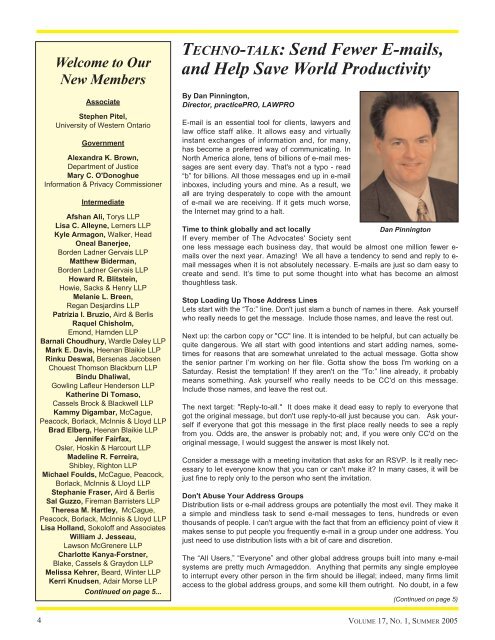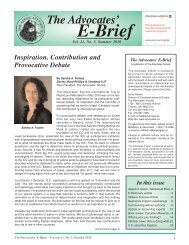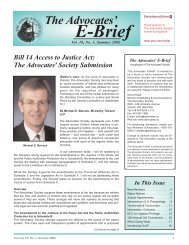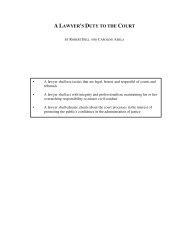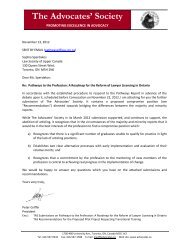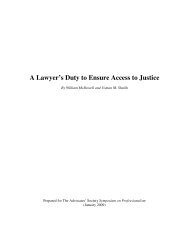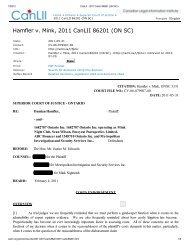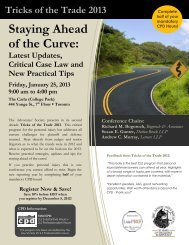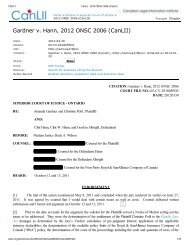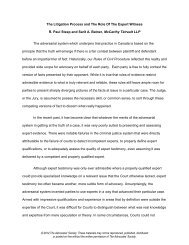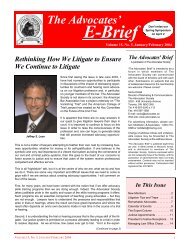E-Brief Sept - Oct - The Advocates' Society
E-Brief Sept - Oct - The Advocates' Society
E-Brief Sept - Oct - The Advocates' Society
You also want an ePaper? Increase the reach of your titles
YUMPU automatically turns print PDFs into web optimized ePapers that Google loves.
Welcome to Our<br />
New Members<br />
Associate<br />
Stephen Pitel,<br />
University of Western Ontario<br />
Government<br />
Alexandra K. Brown,<br />
Department of Justice<br />
Mary C. O'Donoghue<br />
Information & Privacy Commissioner<br />
Intermediate<br />
Afshan Ali, Torys LLP<br />
Lisa C. Alleyne, Lerners LLP<br />
Kyle Armagon, Walker, Head<br />
Oneal Banerjee,<br />
Borden Ladner Gervais LLP<br />
Matthew Biderman,<br />
Borden Ladner Gervais LLP<br />
Howard R. Blitstein,<br />
Howie, Sacks & Henry LLP<br />
Melanie L. Breen,<br />
Regan Desjardins LLP<br />
Patrizia I. Bruzio, Aird & Berlis<br />
Raquel Chisholm,<br />
Emond, Harnden LLP<br />
Barnali Choudhury, Wardle Daley LLP<br />
Mark E. Davis, Heenan Blaikie LLP<br />
Rinku Deswal, Bersenas Jacobsen<br />
Chouest Thomson Blackburn LLP<br />
Bindu Dhaliwal,<br />
Gowling Lafleur Henderson LLP<br />
Katherine Di Tomaso,<br />
Cassels Brock & Blackwell LLP<br />
Kammy Digambar, McCague,<br />
Peacock, Borlack, McInnis & Lloyd LLP<br />
Brad Elberg, Heenan Blaikie LLP<br />
Jennifer Fairfax,<br />
Osler, Hoskin & Harcourt LLP<br />
Madeline R. Ferreira,<br />
Shibley, Righton LLP<br />
Michael Foulds, McCague, Peacock,<br />
Borlack, McInnis & Lloyd LLP<br />
Stephanie Fraser, Aird & Berlis<br />
Sal Guzzo, Fireman Barristers LLP<br />
<strong>The</strong>resa M. Hartley, McCague,<br />
Peacock, Borlack, McInnis & Lloyd LLP<br />
Lisa Holland, Sokoloff and Associates<br />
William J. Jesseau,<br />
Lawson McGrenere LLP<br />
Charlotte Kanya-Forstner,<br />
Blake, Cassels & Graydon LLP<br />
Melissa Kehrer, Beard, Winter LLP<br />
Kerri Knudsen, Adair Morse LLP<br />
Continued on page 5...<br />
TECHNO-TALK: Send Fewer E-mails,<br />
and Help Save World Productivity<br />
By Dan Pinnington,<br />
Director, practicePRO, LAWPRO<br />
E-mail is an essential tool for clients, lawyers and<br />
law office staff alike. It allows easy and virtually<br />
instant exchanges of information and, for many,<br />
has become a preferred way of communicating. In<br />
North America alone, tens of billions of e-mail messages<br />
are sent every day. That's not a typo - read<br />
“b” for billions. All those messages end up in e-mail<br />
inboxes, including yours and mine. As a result, we<br />
all are trying desperately to cope with the amount<br />
of e-mail we are receiving. If it gets much worse,<br />
the Internet may grind to a halt.<br />
Time to think globally and act locally<br />
Dan Pinnington<br />
If every member of <strong>The</strong> <strong>Advocates'</strong> <strong>Society</strong> sent<br />
one less message each business day, that would be almost one million fewer e-<br />
mails over the next year. Amazing! We all have a tendency to send and reply to e-<br />
mail messages when it is not absolutely necessary. E-mails are just so darn easy to<br />
create and send. It’s time to put some thought into what has become an almost<br />
thoughtless task.<br />
Stop Loading Up Those Address Lines<br />
Lets start with the “To:” line. Don't just slam a bunch of names in there. Ask yourself<br />
who really needs to get the message. Include those names, and leave the rest out.<br />
Next up: the carbon copy or "CC" line. It is intended to be helpful, but can actually be<br />
quite dangerous. We all start with good intentions and start adding names, sometimes<br />
for reasons that are somewhat unrelated to the actual message. Gotta show<br />
the senior partner I’m working on her file. Gotta show the boss I'm working on a<br />
Saturday. Resist the temptation! If they aren't on the “To:” line already, it probably<br />
means something. Ask yourself who really needs to be CC'd on this message.<br />
Include those names, and leave the rest out.<br />
<strong>The</strong> next target: "Reply-to-all." It does make it dead easy to reply to everyone that<br />
got the original message, but don't use reply-to-all just because you can. Ask yourself<br />
if everyone that got this message in the first place really needs to see a reply<br />
from you. Odds are, the answer is probably not; and, if you were only CC'd on the<br />
original message, I would suggest the answer is most likely not.<br />
Consider a message with a meeting invitation that asks for an RSVP. Is it really necessary<br />
to let everyone know that you can or can't make it? In many cases, it will be<br />
just fine to reply only to the person who sent the invitation.<br />
Don't Abuse Your Address Groups<br />
Distribution lists or e-mail address groups are potentially the most evil. <strong>The</strong>y make it<br />
a simple and mindless task to send e-mail messages to tens, hundreds or even<br />
thousands of people. I can't argue with the fact that from an efficiency point of view it<br />
makes sense to put people you frequently e-mail in a group under one address. You<br />
just need to use distribution lists with a bit of care and discretion.<br />
<strong>The</strong> “All Users,” “Everyone” and other global address groups built into many e-mail<br />
systems are pretty much Armageddon. Anything that permits any single employee<br />
to interrupt every other person in the firm should be illegal; indeed, many firms limit<br />
access to the global address groups, and some kill them outright. No doubt, in a few<br />
(Continued on page 5)<br />
4 VOLUME 17, NO. 1, SUMMER 2005


